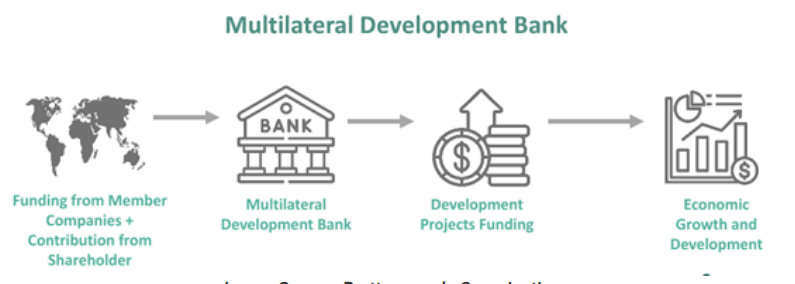Multilateral Development Banks Reforms (GS Paper 3, Economy)

Why in News?
- Recently, the UN Secretary-General emphasized that reforming multilateral development banks (MDBs) will be a major focus at this year's Summit of the Future, taking place during the UN General Assembly in September 2024.
Multilateral Development Banks
- Multilateral Development Banks (MDBs) are international financial institutions tasked with providing financing and expert guidance for economic and social development projects in developing nations.
- These banks are established and funded by multiple countries, pooling resources and offering shared representation on their governing boards.
- Originating in the post-World War II era, their primary aim was to reconstruct war-torn countries and stabilize the global financial system.
Objectives of MDBs
- MDBs prioritize development objectives over profit maximization, unlike commercial banks.
- Their primary focus lies in addressing development challenges, such as eradicating extreme poverty and reducing economic disparities.
- They achieve this by offering loans at low or zero interest rates and providing grants to support projects spanning infrastructure, energy, education, environmental sustainability, and other key developmental areas.
Major MDBs
- Key MDBs include the World Bank Group, the Asian Development Bank, the African Development Bank, the European Bank for Reconstruction and Development, and the Inter-American Development Bank.
Key Challenges Associated with MDBs
- Resource Constraints: MDBs often face limitations due to restricted capital availability, hindering their capacity to finance extensive development endeavors.
- Adapting to Global Challenges: Challenges like climate change, pandemics, and technological disruptions require MDBs to adapt their strategies effectively, which they have struggled to do comprehensively.
- Decision-Making: Some MDBs exhibit voting structures that favor developed countries, necessitating a push for greater representation and transparency in decision-making.
- One-Size-Fits-All Approach: Standardized lending conditions may not adequately address the diverse economic circumstances and capabilities of developing countries.
Necessary Reforms in MDBs
- Financing Climate Action: MDBs should enhance efforts to mobilize resources for climate change mitigation and adaptation, possibly through dedicated finance mechanisms and innovative instruments.
- Knowledge Sharing & South-South Cooperation: Facilitating knowledge exchange between developing countries can foster collaboration and support the adoption of successful development strategies.
- Graduation Strategies: Implementing clear pathways for middle-income countries to transition from concessional to market-rate financing, allowing MDB resources to be directed towards countries still in need.
- Social and Environmental Safeguards: Strengthening safeguards to ensure MDB-funded projects promote sustainable development while avoiding adverse social and environmental impacts.


